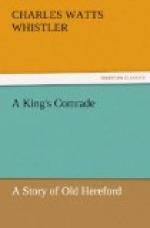“What does that portend?” I said.
He lifted his eyes slowly to mine, and answered, “Why need you ask?”
I did not answer him, for, in truth, I only asked with a half hope that he might have some other interpretation of this portent than that of violent death, which seemed the plain meaning of it—that is, if he saw aught, and I had no reason to disbelieve him. I tried to think that his glance had met the sun for a moment before he looked on the king; but I could not think it, for in the hall was no chance thereof. And then he spoke again slowly, with his eyes still on the ground.
“Thrond, who is my uncle, saw the same on the mail of my father not long before he fell. He said at that time that so it had often been in our family; but this has not come to me until I came here. I had no second sight up to this time.”
“It is sent for some reason, therefore,” said I. “Now, is it possible to avert the doom which seems written?”
He shook his head. “I have never heard so,” he answered.
“Yet the king does not seem fey,” said I, “and there is no man in all this land who would harm him. Ah, maybe you saw the robe as of a saint, because all men hold him most saintly!”
“May it he so,” he answered. “You are Christian folk, and it may mean that; I will hope it does. How should a heathen man know what is for you? Over you the Norns may have no power. Pay no heed to me.”
“No,” said I. “We ride to Offa with the king in a few days, and if you and I have fears for him, there are two who will watch him carefully. That is why the sight has come to you, I think. There is danger, and we may meet it.”
Thereat he cheered up, for the thought of facing a peril heartened him. His heathen fear of fate was enough to make any man downcast when it seemed to promise naught but ill, and I verily believe that he thought the way of the Christian might be altogether different from his. But I liked his second sight not at all, for of course we Saxons know that when it is given it is not to be despised. My father had many times told me of the like before I heard this.
After that I asked now and then if there was any danger to be guarded against on the way to Fernlea, and I was told by all that there was none. Hardly would a strong guard be needed, for the hand of Offa was heavy on ill doers, and his land had peace from end to end.
So then I began to think the portent altogether heathenish, and half forgot it. And with that I hoped that Erling would not often be taken in this way.
I rode with the Franks for an hour or two on their road back to Norwich, homeward, and then took leave of them, riding back to Thetford with Erling alone, for the king had but set the embassy as far as the gates of the town. And as I watched them pass across the heaths and at last disappear behind a hill, it seemed to me that I had my life to begin afresh, for the days when I was one of the paladins of King Carl of the Franks were past and done with. Many were the lessons I had learned therein, and I have never regretted those five years; and, best of all, in them I had been the friend and close comrade of Ecgbert, who I know had then all the promise of his greatness of the days to come.




